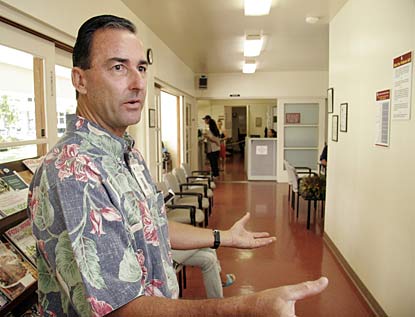
|
Waikiki center is
expanding for patients
The health facility provides
care for many uninsured
The Waikiki Health Center has turned around operations from a financial crisis three years ago to expansion to meet patient needs.
Patients give center high marks
Waikiki Health Center director Paul Strauss was so proud of the results of a patient satisfaction survey last year that he had them posted in the waiting room.
Forms were mailed to several hundred patients, with a 30 percent return, and the clinic ranked "on top with good to great in every category despite surging growth," he pointed out. "There are constant kudos on staff friendliness." Among patient comments:
» "I don't have health insurance, but I have peace of mind knowing that I can afford birth control and my annual exam."
» "Your clinic has helped me through some of my worst times. ... I refer anyone I can to the clinic." » "I like the fact that no one looks down on us for our living situations and beliefs."
Helen Altonn
|
"We serve everyone regardless of ability to pay, and we are responding to the needs, despite many challenges of the uninsured population and limited funding, because of the support and dedication of the staff and board."
Among recent developments, the center has:
» Doubled medical exam rooms to 10 from five at the Waikiki clinic at 277 Ohua Ave.
» Established a homeless drop-in center at 1640 S. King St. with medical and social services and an HIV wellness program.
» Expanded clinic hours for its Youth Outreach Project in Waikiki and increased services from one to two days at its mobile clinic at Queen Liliuokalani Protestant Church at Haleiwa. Strauss is looking for a permanent site for the Haleiwa clinic because of increased demand for medical services.
» Started recruiting two licensed clinical social workers with psychotherapy training to provide mental health treatment.
One of the oldest of Hawaii's community health centers, the Waikiki center has been providing health care to the needy and others for more than 30 years.
When serious financial problems surfaced, the center reduced staff and worked with funders to re-budget contracts, said Mary Spadaro, director of development. But no programs were cut, she said.
A large federal grant for homeless services helped the center through the crisis, and it took measures to improve finances, she said.
Strauss, appointed in October 2003, boosted patient revenue largely with improved billing systems, she said. "We are able to collect a great deal more for services we provide from third-party payers, including Med-QUEST and Medicaid."
Strauss said the total annual operations budget is $3.3 million; two years ago it was $2.7 million. Government grants are continuing at a static 48 percent, charitable contributions amount to about 18 percent and patient service fees have doubled to 28 percent, he said.
An eligibility worker was hired to enroll patients in any insurance program they might be eligible for, Spadaro said. "That helps the patients and it helps the health center." With additional revenue, more services can be provided to more people, she said.
Strauss said the health center overall had about 6,000 patients and 12,000 medical visits the past year. The volume of services increased 22 percent, presenting serious challenges, he said.
Until medical exam rooms were doubled this month at the Ohua clinic, he said, "We had as many as 20 walk-in patients per day on top of full appointment booking."
With the spiraling increase in housing costs, people are being forced out of apartments and are "on the margin," Spadaro said. "Some are slipping over and need services like ours."
"Unfortunately, people don't know about this (clinic)," said Dr. Elliot Kalauawa, medical director.
Spadaro said they are hoping improvements made to the Waikiki clinic's appearance, patient flow and scheduling will encourage more people who are not necessarily needy to consider using the health center.
The full fee, for those capable of paying it, is usually considerably less than the traditional private clinic or the patient's insurance company can be billed, she said. "This assists us in seeing other patients who are needy."
Some administrative offices were relocated from the Waikiki clinic to the King Street site to free space for the additional exam rooms.
Two rooms in the Waikiki clinic will be used for behavioral health consulting services, Strauss said. It also has a full-time nutritionist, a case worker and Hawaiian healer, Francine Dudoit, among other staff members.
The goal is to serve as one stop for medical, mental and social services, Strauss said.
Many patients have mental health problems, so one of the two social workers will work in the Waikiki clinic and the other with the homeless in the outreach programs.
The Hawaii Medical Service Association Foundation and state Health Department's Adult Mental Health Division are helping to support the center's mental health services.
The health center's Care-A-Van Program moved to the King Street site to serve the homeless there and from two vans that serve as mobile clinics at parks and beaches.
"It's a world of difference from where we were," said Darlene Hein, Care-A-Van Program director, noting the program has had to move often. Three nurse practitioners see patients and prescribe medicine at the homeless drop-in center and take turns doing outreach in the vans.
Clients can use the drop-in center's telephones and address for mail, noted Adrianna O'Donnell, assistant director of development.
Clothing and snacks, such as nutrition bars and granola, are available, she said. The facility has storage space so it can accept more donations, she said.
"We're doing incredibly wonderful things here," said Valerie Foree, family nurse practitioner. "I am thrilled. We have the tools we need to take care of this high-risk and vulnerable population. I obviously love that."
E-mail to City Desk
[News] [Business] [Features] [Sports] [Editorial] [Do It Electric!]
[Classified Ads] [Search] [Subscribe] [Info] [Letter to Editor]
[Feedback]
